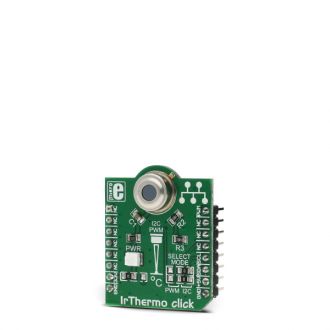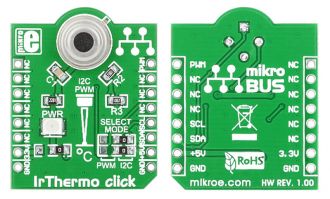
We strongly encourage users to use Package manager for sharing their code on Libstock website, because it boosts your efficiency and leaves the end user with no room for error. [more info]

Rating:
Author: MIKROE
Last Updated: 2018-05-17
Package Version: 1.0.0.1
mikroSDK Library: 1.0.0.0
Category: Temperature & humidity
Downloaded: 7779 times
Followed by: 1 user
License: MIT license
This example demonstrates reading from Ir thermo sensor MLX90614ESF-AAA Temperature is converted into Celsius degrees and displayed on display.
Do you want to subscribe in order to receive notifications regarding "IrThermo 5v click" changes.
Do you want to unsubscribe in order to stop receiving notifications regarding "IrThermo 5v click" changes.
Do you want to report abuse regarding "IrThermo 5v click".


Front and back side appearance of the IrThermo 5V click Board.
View full imageLibrary Description
Key functions:
Examples Description
The application is composed of three sections:
void applicationTask()
{
measuredTemperature = irthrm5V_getTambient();
FloatToStr(measuredTemperature,text);
mikrobus_logWrite("Ambient Temperature: ",_LOG_TEXT);
mikrobus_logWrite(text,_LOG_LINE);
Delay_ms(1000);
}
Other mikroE Libraries used in the example:
Additional notes and information
Depending on the development board you are using, you may need USB UART click, USB UART 2 click or RS232 click to connect to your PC, for development systems with no UART to USB interface available on the board. The terminal available in all MikroElektronika compilers, or any other terminal application of your choice, can be used to read the message.